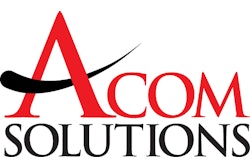As market for radio frequency solutions grows, established enablers forging alliances with smaller players to add key capabilities, research firm finds
Oyster Bay, NY — April 21, 2005 — As radio frequency identification (RFID) mandates multiply in numbers among major retail chains, small RFID-centric companies are forging alliances with established players in the field, providing key capabilities and impetus for technological advancement, according to a new report from technology consultancy ABI Research.
Also this week, ABI debuted its RFID Industry Database, providing a searchable online directory of product and service offerings in the RFID space.
RFID mandates have moved beyond Wal-Mart to businesses such as Target, Albertsons and Best Buy, as well as Tesco and MetroAG, and to help serve this market as it grows, many of the most significant RFID vendors and integrators — the "Goliaths" of the marketplace — are forging partnerships with smaller, more agile developers.
These RFID "Davids" have been producing UHF RFID products, building a good business in these early stages of RFID and continuing to educate the market and to provide innovation, personnel and research, ABI reports in the latest edition of its "RFID Research Service," which dissects the RFID industry using a three-tiered approach based on the relationship between technologies, markets and competition.
Understanding RFID at the Network Edge
"These small companies can bring great value to the table," says Erik Michielsen, director of RFID and ubiquitous networks at ABI. "They are in a great position to complement their larger partners' skill-sets in broader areas such as enterprise resource planning, warehouse management systems or automatic data capture."
Michielsen said that the smaller companies understand RFID at the network edge and are now partnering with larger organizations that provide more enterprise focus, more company-wide integration services and global customer support. "Not only do these smaller companies' products win accolades from end-users, but they themselves have end-user relationships, from earlier work on smaller projects," Michielsen said. "They must be taken seriously."
So, for instance, OAT Systems is partnering with Symbol Technologies, ADT and Hewlett-Packard. Acsis is another example, with its relationships with SAP and HP, Symbol and Intermec.
But partnerships may only be a way-station for RFID vendors. ABI forecasts that out-and-out acquisitions will become more common, and there will be major consolidation as larger vendors better understand where these small companies fit into their portfolios.
RFID Directory Debuts
Elsewhere this week, ABI debuted its RFID Industry Database, which details RFID company backgrounds, product and service offerings, regional capabilities, relevant partnerships, customer wins and the companies' positions relative to competitors, applications and vertical markets.
Until now, says ABI, it has been difficult to do a systematic comparison of these firms and their technologies. While earlier versions of this offering were provided in printed form — necessitating laborious data mining through series of charts — the latest edition is entirely online and searchable by users, ABI said.
All the company profiles are to be updated quarterly, in conjunction with ABI's regular RFID Market Update, which qualitatively describes industry developments in the preceding three months. "The rest of the information is refreshed in real time, as our researchers acquire it," said ABI Research analyst Sara Shah.
Online Searches
According to ABI, the new service allows users to customize online searches to a very precise set of parameters: by tag type, reader type and frequency, for example. Users can also search for companies by application, frequency, standard, vertical market and company focus.
The included ABI Vendor Matrices — which assess vendors on the twin axes of "innovation" and "implementation" — can be sorted by company focus: tag, reader or IC manufacturers, software providers, integrators, label/printer providers and industrial automation suppliers.
The RFID Industry Database is available as part of the ABI Research RFID Research Service, an annual subscription that provides updates on the RFID market, and also includes research reports, forecast databases, analyst access and analyst insights.
Additional Articles of Interest
— For more information on trends relating to radio frequency identification (RFID), follow this link for an extensive listing of SDCExec.com articles, featuring the latest research findings on the RFID, including adoption, return on investment and barriers to implementation.
— For a contrary view of the future of the RFID market, see the article "The O'RFID Factor: A 'No Spin' Look at Where Radio Frequency Identification Is Headed," in the October/November 2004 issue of Supply & Demand Chain Executive.
Oyster Bay, NY — April 21, 2005 — As radio frequency identification (RFID) mandates multiply in numbers among major retail chains, small RFID-centric companies are forging alliances with established players in the field, providing key capabilities and impetus for technological advancement, according to a new report from technology consultancy ABI Research.
Also this week, ABI debuted its RFID Industry Database, providing a searchable online directory of product and service offerings in the RFID space.
RFID mandates have moved beyond Wal-Mart to businesses such as Target, Albertsons and Best Buy, as well as Tesco and MetroAG, and to help serve this market as it grows, many of the most significant RFID vendors and integrators — the "Goliaths" of the marketplace — are forging partnerships with smaller, more agile developers.
These RFID "Davids" have been producing UHF RFID products, building a good business in these early stages of RFID and continuing to educate the market and to provide innovation, personnel and research, ABI reports in the latest edition of its "RFID Research Service," which dissects the RFID industry using a three-tiered approach based on the relationship between technologies, markets and competition.
Understanding RFID at the Network Edge
"These small companies can bring great value to the table," says Erik Michielsen, director of RFID and ubiquitous networks at ABI. "They are in a great position to complement their larger partners' skill-sets in broader areas such as enterprise resource planning, warehouse management systems or automatic data capture."
Michielsen said that the smaller companies understand RFID at the network edge and are now partnering with larger organizations that provide more enterprise focus, more company-wide integration services and global customer support. "Not only do these smaller companies' products win accolades from end-users, but they themselves have end-user relationships, from earlier work on smaller projects," Michielsen said. "They must be taken seriously."
So, for instance, OAT Systems is partnering with Symbol Technologies, ADT and Hewlett-Packard. Acsis is another example, with its relationships with SAP and HP, Symbol and Intermec.
But partnerships may only be a way-station for RFID vendors. ABI forecasts that out-and-out acquisitions will become more common, and there will be major consolidation as larger vendors better understand where these small companies fit into their portfolios.
RFID Directory Debuts
Elsewhere this week, ABI debuted its RFID Industry Database, which details RFID company backgrounds, product and service offerings, regional capabilities, relevant partnerships, customer wins and the companies' positions relative to competitors, applications and vertical markets.
Until now, says ABI, it has been difficult to do a systematic comparison of these firms and their technologies. While earlier versions of this offering were provided in printed form — necessitating laborious data mining through series of charts — the latest edition is entirely online and searchable by users, ABI said.
All the company profiles are to be updated quarterly, in conjunction with ABI's regular RFID Market Update, which qualitatively describes industry developments in the preceding three months. "The rest of the information is refreshed in real time, as our researchers acquire it," said ABI Research analyst Sara Shah.
Online Searches
According to ABI, the new service allows users to customize online searches to a very precise set of parameters: by tag type, reader type and frequency, for example. Users can also search for companies by application, frequency, standard, vertical market and company focus.
The included ABI Vendor Matrices — which assess vendors on the twin axes of "innovation" and "implementation" — can be sorted by company focus: tag, reader or IC manufacturers, software providers, integrators, label/printer providers and industrial automation suppliers.
The RFID Industry Database is available as part of the ABI Research RFID Research Service, an annual subscription that provides updates on the RFID market, and also includes research reports, forecast databases, analyst access and analyst insights.
Additional Articles of Interest
— For more information on trends relating to radio frequency identification (RFID), follow this link for an extensive listing of SDCExec.com articles, featuring the latest research findings on the RFID, including adoption, return on investment and barriers to implementation.
— For a contrary view of the future of the RFID market, see the article "The O'RFID Factor: A 'No Spin' Look at Where Radio Frequency Identification Is Headed," in the October/November 2004 issue of Supply & Demand Chain Executive.
- More research from ABI Research.








